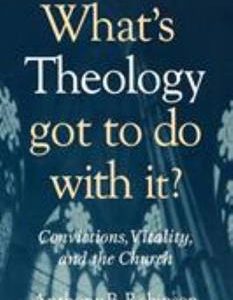Why “Hebrews”? Why Now?
The “Epistle to the Hebrews” is an often overlooked book of the New Testament. Unexplored territory. I won’t go, here, into the possible reasons for that relative neglect.
What I will say is that the Holy Spirit seems to have decided that I, for one, need to explore this territory. In one of the Crackers and Grape Juice podcasts featuring me and Will Willimon, I brought up the strange urgency I was feeling around this.
A couple things have happened since then. My co-author on two books, Rob Wall, and I have agreed to do a winter quarter on-line class on Hebrews for students in Seattle Pacific’s M.Div. program. Also I have tentatively signed on to be part of a teaching team for another on-line class on Hebrews this fall with CGJ host, Jason Micheli. And I’ve decided to structure an upcoming September event for Anglican Clergy in a diocese in Ontario around Hebrews.
As to why this book of the Bible and why now, I can’t do better than to quote from Tom Long’s commentary on Hebrews in the Interpretation series. Long terms the unknown author of the epistle, “The Preacher” because the epistle is really a sermon. Here’s Long:
“The Preacher is not preaching into a vacuum; he is addressing a real and urgent pastoral problem, one that seems astonishingly contemporary. His congregation is exhausted.
“They are tired — tired of serving the world, tired of worship, tired of Christian education, tired of being peculiar and whispered about in society, tired of the spiritual struggle, tired of trying to keep their prayer life going, tired even of Jesus.
“Their hands droop and their knees are weak (12: 12), attendance is down at church (10:25), and they are losing confidence. The threat to this congregation is not that they are charging off in the wrong direction; they do not have enough energy to charge anywhere. The threat here is that, worn down and worn out, they will drop their end of the rope and drift away. Tired of walking the walk, many of them are considering taking a walk, leaving the community and falling away from the faith.
“We recognize the problem, of course, but the Preacher’s response may astound us. What is most striking about Hebrews is that the Preacher, faced with the pastoral problem of spiritual weariness, is bold enough, maybe even brash enough, to think that christology and preaching are the answers.
“The Preacher does not appeal to improved group dynamics, conflict management techniques, reorganization of the mission structures, or snappy worship services. Rather, he preaches — preaches to the congregation in complex theological terms about the nature and meaning of Jesus Christ.”
2021 finds many of us exhausted and drifting. As Long notes, this epistolary sermon doesn’t seek help from better management techniques, strategic planning or ideas to jazz up worship. His response is theological.
 Some of you may recognize this echoes the theme of one of my own books, What’s Theology Got To Do With It: Convictions, Vitality and the Church. In that book I argued that congregational health and vitality had everything to do with clarity about our core theological convictions and our ability to deploy them in the life of the church.
Some of you may recognize this echoes the theme of one of my own books, What’s Theology Got To Do With It: Convictions, Vitality and the Church. In that book I argued that congregational health and vitality had everything to do with clarity about our core theological convictions and our ability to deploy them in the life of the church.
A final note. The title, “A Letter to the Hebrews” ought not suggest this is any kind of anti-Jewish polemic. It is emphatically not. It is written to a Christian congregation, possibly located in Rome. The title, “To the Hebrews” may be a the result of a scribe arbitrarily assigning it. Or there may be something other explanation. We’ll see.
![Anthony B. Robinson [logo]](https://www.anthonybrobinson.com/wp-content/themes/anthonybrobinson/images/logo.png)
![Anthony B. Robinson [logo]](https://www.anthonybrobinson.com/wp-content/themes/anthonybrobinson/images/logo-print.png)